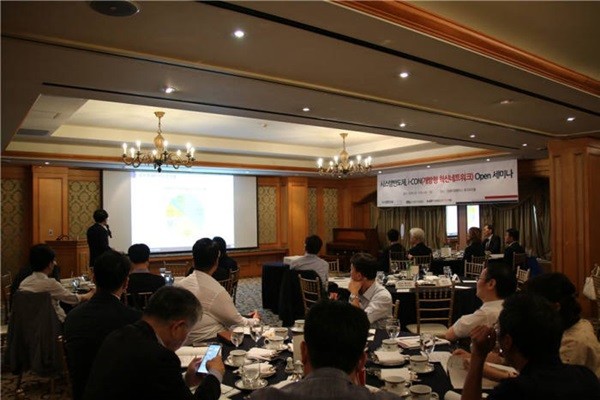As ‘system semiconductor i-CON (Innovation-Communication Open Network)’, which was established in May, has been picking up steam, a place for ‘open innovation’ between small to midsize system semiconductor companies and experts has been created as a result.
According to Ministry of SMEs and Startups (MSS), Korea Venture Business Association (KOVA), and Korea Entrepreneurship Foundation (KOEF), system semiconductor i-CON had held nine seminars, forums, and advisory meetings since it was established in May and it has induced collaborations between private experts and small to midsize companies and found three innovative R&D projects.
Because there have been many cases of collaboration within the private sector through networking between major participants, it is expected that effects of open innovation in the field of system semiconductor will take place on full-scale starting from 2021.
i-CON is a program that sets up networks between private experts and innovative small to midsize companies to look for R&D projects and supports these companies with commercialization, attraction of investments, and overseas expansion. 144 private experts are currently active in the field of system semiconductor.
In this year so far, system semiconductor i-CON has been working hard to induce collaborations between small to midsize companies and experts, present directions for establishing policies to support small to midsize fabless companies, look for ways to have small to midsize companies collaborate within themselves or collaborate with foreign institutions and companies, and expand local networks.
The industry highly praises the fact that small to midsize companies and venture companies are making political suggestions and participating more as suggestions and difficulties that system semiconductor companies are facing have been heard through open seminars and forums. This part is different from meetings of other departments that focus on the recent trends of latest technologies, technical standards, and R&D.
“Through i-CON, we have carried out various activities such as connecting relevant companies with businesses, looking for customers, and looking for new national projects.” said Director Jung Bo-seon. “Above all, we are extremely pleased with the fact that we have shared difficulties such as manpower shortage, weakened competitive edge of products, and increased production cost of prototype that fabless companies are facing with Minister Park Young-seon of MSS and representatives of other relevant departments and that they are working hard to prepare support measures based on opinions from the industry.”

MSS expressed its desire to support and to promote the system semiconductor industry by holding its first Future Industry Innovation Forum that was held in August as system semiconductor i-CON.
The forum also acted as a window for consultations regarding policy making and it discussed about ways to support fabless companies through advisory meetings with experts. It has also prepared grounds for South Korean companies to work with foreign companies by having a seminar for collaboration between South Korea and China and a seminar involving a foreign company owned by a South Korean CEO.
Finding collaborative projects with outstanding companies and connecting projects with South Korean Government’s plan to support R&D through recommendations is also another important role of i-CON. The consultative group selected three recommended projects to participate in MSS’ R&D network-type project.
“While the current way of recommending projects is centered on quantitative evaluation and lacks objective results and is not suitable to recommend excellent companies, i-CON provides opportunities for us to support innovative companies.” said CEO Kim Young-jae of IP Frontiers. “However, because actual evaluation process is based on quantitative evaluation and lacks the meaning of an actual evaluation, it will be nice to give points to companies recommended by i-CON on project selection and progression through policies such as Fast-Track policy.
Staff Reporter Jung, Hyeonjung | iam@etnews.com